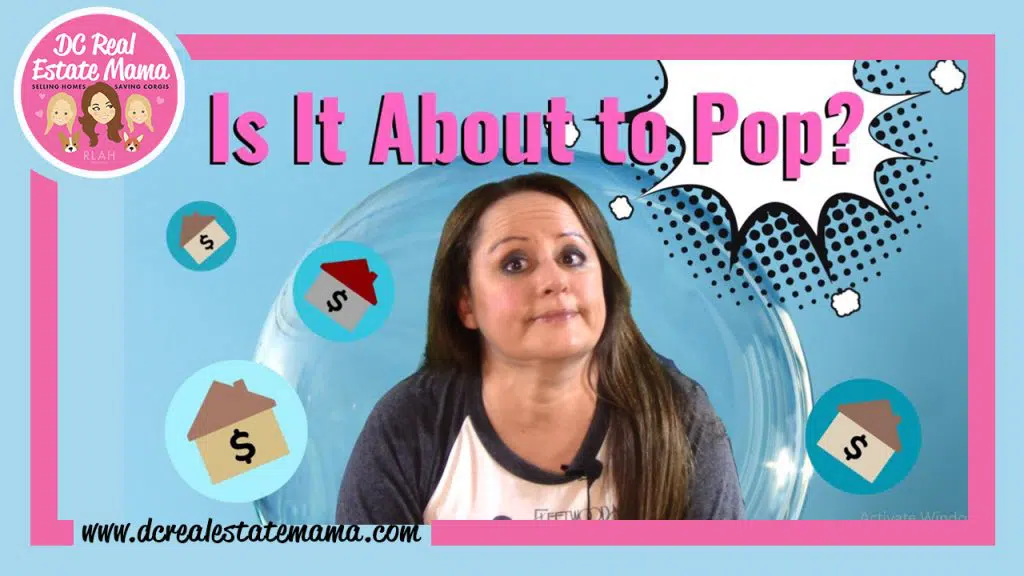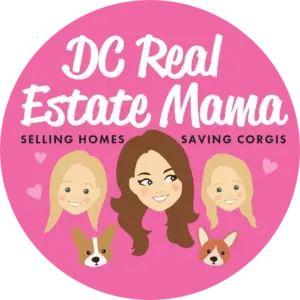Washington DC Real Estate Housing Bubble
Are you thinking of purchasing real estate but aren’t sure if there is a Washington DC Housing Bubble? Let’s review four ways to identify if you might be purchasing real estate inside of a real estate bubble. By examining the housing bubble of 2007, we’ll learn how you can best protect yourself and your investments.
Washington DC Housing Bubble: Learning from the Past
When COVID first hit, all of us thought that the real estate market—as well as every other industry—was going to take a dive. What we didn’t realize was that wasn’t going to happen. For about two weeks or so, people waited on edge to see what was going to happen with the housing market. And then, everybody was back in it.
To understand the housing situation today, let’s go back a little bit. I am not new to this rodeo; I remember 2007 like it was yesterday. I was working for a national builder. It was ingrained in us from the powers that be that “DC is recession proof” and there wasn’t, nor would there ever be a “DC Housing Bubble.”
That wasn’t entirely true. If you’ll be living in DC, you need to know what areas may be prone to inflated home prices and what areas are usually a safer buy.
The Housing Bubble Pops
One day in 2007, the phones stopped ringing. Just like that. It was like death came for all of us. We all know how the rest of that story played out – it was a catastrophe for many people who lost everything. All things considered—and for as bad as everything got with subprime loans, Wall Street taking a dive, and entire subdivisions filled with foreclosures—things started looking up by 2011 and 2012.
Smaller investors, those that were not beholden to Wall Street or any board of directors, were buying up properties in the DC area. They were preparing to either sit on them or slowly flip them when the market came back. The roller coaster was back on the track. “It’s different this time,” they said. “The mortgage market is totally locked down, unlike it was before with all the subprime loans,” they said. “We’re practically recession-proof in DC,” they said.
Taking a Lesson from 2007
The 2007 housing market bubble is a disaster only if we don’t learn from it. Nobody has a crystal ball. Nobody knows where the bottom of any real estate market is—despite what they love to tell you and what everybody loves to sit on TV and talk about. Nobody ever really knows where the bottom or the top of a market is until you’re six months past it. By then, it’s too late to go back in time and make a purchase or conduct a sale of your property because home prices are already working against you.
That being said, there are some things that you can do to protect yourself. Keep your eyes open to make sure that you’re not making a huge mistake. Here’s my best advice, after 20 years in the real estate industry, and in various facets of it, that will help you make good decisions. I don’t want you to be left holding the proverbial bag.
DC Real Estate Market Bubble: How to Protect Yourself
There are several things you can look out for to ensure you buy in a bubble. Many let emotion step into the transaction and that’s always going to steer homebuyers wrong. In “normal” days, there was virtually no DC Real Estate Market Bubble of which to speak. DC inside the city limits has generally enjoyed a strong housing market. The close-in suburbs of Maryland and Virginia held their value as well – there was always a steady supply of people fleeing the city for more space or more reliable schools for their children. Home prices adjusted though as the pandemic resulted in a shift in desires.
The best neighborhoods in DC, Maryland and Virginia have held on to their reigning top spots on homebuyer’s lists. Many of these areas just had more buyers show up to bid but as the prices were already quite high in these areas, they didn’t end up with the huge price escalations making the news. Other areas which weren’t as hotly desired have also emerged as frontrunners and some of those escalated prices are a cause for concern. So, let’s dive in. What can you do to protect yourself from making a mistake?
1. Don’t Go To Parties
So first off, don’t go to parties. What? What are you saying? Yep, I said don’t go to parties.
Here’s what the pandemic did. It put a halt to all holiday parties because nobody could have one. So while the pandemic brought the real estate boom, it also crushed the holiday party market—which is a good thing. Because thank goodness, holiday parties tend to always be the ground zero of real estate braggery. I don’t think that’s a word, but I am now making it up.
Real estate braggery occurs. The secret is that nobody ever cops to making a bad real estate investment. They always say that they made the greatest investment and they made a ton of money. The problem is that perception is reality. So people hear this and they believe it.
I’m telling you, though, not to believe these things. Don’t put yourself in the path of real estate braggery. These are often filled with lies that people like to say to brag and make themselves feel better about the investment that they made. Usually, when you start digging into their claims, you realize that people were either very highly leveraged and they didn’t make anywhere near the amount of money nor were they as astute of an investor as they want everybody else to believe.
2. Don’t Follow The DC Bubble Crowd
The second way to protect yourself from a DC Bubble is by not following the crowd. “But everybody else is doing it,” you might say. So, what? If everybody else jumped off the Brooklyn Bridge, would you do it too? No, you would not—well, I hope you wouldn’t.
You don’t want to follow the crowd in real estate. This is the problem: there’s always somebody that’s going to be last in that line when you’re following the crowd. You do not want to be that person. You want to go where nobody else is. You want to plunk down your money, hang out, and wait.
Think about those investors from 2011 and 2012 that I told you about, the ones that weren’t beholden to Wall Street and were buying up properties in DC and sitting on them until the market turned. Those are the guys that made a lot of money. Of course, they’re going to brag about how much money they made. But let’s take it into perspective: they had some holding costs and potential investors to pay. Everything’s relative. Everything ends up working out in the end, and nobody ends up becoming a gazillionaire. This is just about hedging your bets to make sure that you protect yourself as much as possible.
For example, right now there are incredible values in condos. You want to look at and buy condos. It’s true that condos can be not that great of an investment. Condo fees can go up and special assessments that can potentially come into play to cut away at your investment. But here’s the thing that I’m seeing even in really close-in areas in DC, Arlington, Alexandria—places that people have coveted where there were multiple offers: nobody wants to touch the condo right now.
They don’t want to be in communal living spaces. They don’t want to be in a smaller space. They want a yard. They want their own outdoor space. This is where the value is. You have to go where the people aren’t and then make your own way. Some condos are 20% off what they would have sold for before COVID. This is a real advantage because the vaccine’s coming. We all know it’s coming. Things are going to change and they’re going to start to change swiftly.
3. Don’t Live In Today
Do not live only for today. Today there’s a pandemic. Today everybody wants to abandon their condo and small living space—the place they downsized to—and move to some giant cabin out in the middle of nowhere. I don’t get it either.
No one really thinks about tomorrow, and tomorrow is going to come. People are going to want to live in cities again. I still believe in cities and I think they are the greatest thing. My kids are growing up in a city. I’ve seen incredible differences in them in general as little people living in a city than, like for me, living in the suburbs where I grew up.
People will eventually be commuting back to offices again. Think about 5, 7, and 10 years from now. Are we still all going to be working from home?
People will want to downsize. I am one of those people. I would like to throw everything away in my house and live in a studio apartment where I can plug the vacuum cleaner in at one outlet and vacuum the whole place without ever having to move. But I have a husband, two kids, and three dogs. I can’t do it.
4. When The Market Defies All Logic, Stand Down
My fourth piece of advice is when the market defies all logic, stand down. What the hell does this mean? Things only change with rapid speed when there’s some sort of panic, which we’re experiencing right now with the pandemic.
For example, in real estate, there has yet to be a Christmas that I’ve ever experienced where things don’t just slow down to this grinding halt. There’s usually time padded—maybe a week before and a week after Christmas—where things are completely silently dead. So if you want to invest in real estate and you want to be smart, what should you do? Well, save money and wait this stuff out. This is what I am doing right now. I am not thinking about buying any more investment properties. I’ve bought some. I’ve watched the market. But now, I’m standing down and I’m waiting all of this out.
If I did anything, I would do something on a condo. But I still don’t even want to do that right now, just because I feel better sticking the money in the bank and watching and waiting to see what happens. If I’m going to buy, I’m not going to buy when there are rock-bottom interest rates. I’m going to save the money.
The Ups And Downs Of Interest Rates & the DC Real Estate Bubble
Remember, for the people living in today, as soon as interest rates tick up a quarter-point, bam—you lost half the market. They’re gone. They don’t want to buy anymore because everybody looks at what was in their pocket that they could have gotten but they didn’t. Interest rates are 2.75% today. I know that sounds crazy. There may be a time we can’t believe mortgage rates were 2.75%, but today they are.
Different things will happen in DC, Maryland or Virginia. The location chosen will determine how susceptible a homebuyer would be to a bubble.
Once mortgage rates push higher, things change. Does that mean you’re going to lose a ton of value in the market? The market’s always going to stabilize where it needs to. Does it mean that you need to wait until everything goes back to 6% to buy? No, you only need a quarter or half a point to watch everybody scramble the hell out of the market.
If you’ve saved a ton of money, then you’re going to be in better shape than you would have been with a lower down payment, going in very highly leveraged with a high loan to value. It bears repeating that you have to go where people aren’t. I tell clients that the best way to protect yourself is to go for a house that’s been overlooked by others. The house needs work, it’s been sitting on the market, or the agent that they hired took horrible pictures that render sideways on the internet and you have to turn your head just to see them. This is more common than I wish it was.
Is There a Housing Bubble in DC Right Now?
The steady lack of homes for sale in the DC area, combined with a strong job market has fueled the real estate market for many years. Areas farther from the downtown area that were not in demand pre-pandemic have seen lots of interest. Many of these areas are only now desired because homebuyers are fleeing higher density living. Without other features in place to support the new desire to live in these areas, I strongly caution people to consider whether the value will remain once the pandemic is over.
Housing Bubble DC: Final Thoughts
Overall, you have to go where the people aren’t to protect yourself. Find the property that’s been overlooked and needs some paint, some work, and maybe a light renovation. There are so many resources to help you figure out how to best renovate it and how to walk away with equity. You’ll also learn how to have a house where you won’t feel like you’ve been completely taken advantage of and bought at the top of the market. Some people bought at the top of the 2007 market and it took them until 2015 or 2016 to break even, get their money back, and sell. You do not want to be that person.
I hope this helped you understand how to keep yourself out of the housing bubble. If you have any questions, feel free to contact me and I’d be happy to help.
Washington DC Housing Bubble FAQ’s
Is Now a Good Time to Buy a House in Washington DC?
Historically there has never been a bad time to buy a house in DC except during 60’s race riots and the early 90’s when crime was at all time highs. Those days seem to be thankfully in the past and for the past 25 years, it’s always been the right time to buy a house in DC.
Will DC Home Prices Drop?
Homes that have always been desirable, such as those in sought-after school districts with neighborhood amenities and enviable outdoor space will rarely see a drop in value. Condos do tend to fall in and out of favor but have remained an affordable way for many to live in the middle of some of the most desirable neighborhoods.
Is DC Real Estate Overpriced?
As prices have steadily climbed in DC since the mid 1990’s, it’s somewhat safe to say there’s not a DC Market Housing Bubble. Areas outside the city in Maryland and Virginia suburbs have values that ebb and flow depending on timing, plus a variety of circumstances. I’ll always tell the truth, so let me know if you have specific questions about a particular area.






Hi there,
My husband and I stupidly bought a house in Kensington MD we absolutely hate during the pandemic. Our realtor told us it was a ‘great investment’ meanwhile convincing us to offer 100k above other properties in the area. We don’t have the money to renovate. We could sell it and lose all our down payment, or hold it and rent it out. We know we were idiots but we need good advice going forward. Any suggestions?